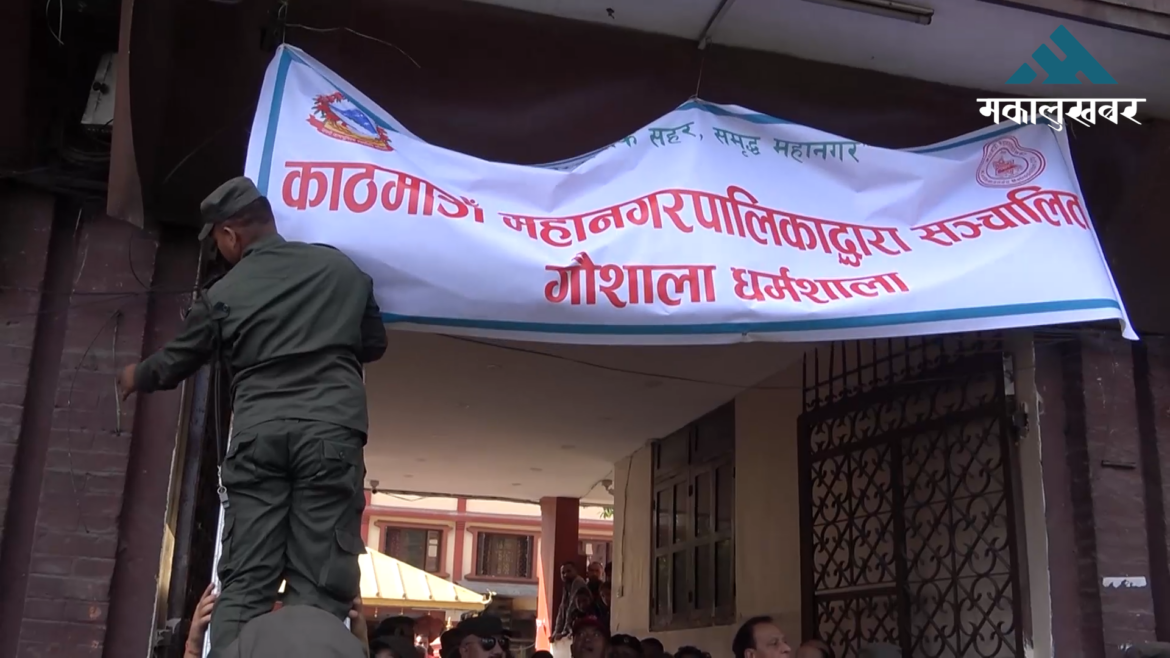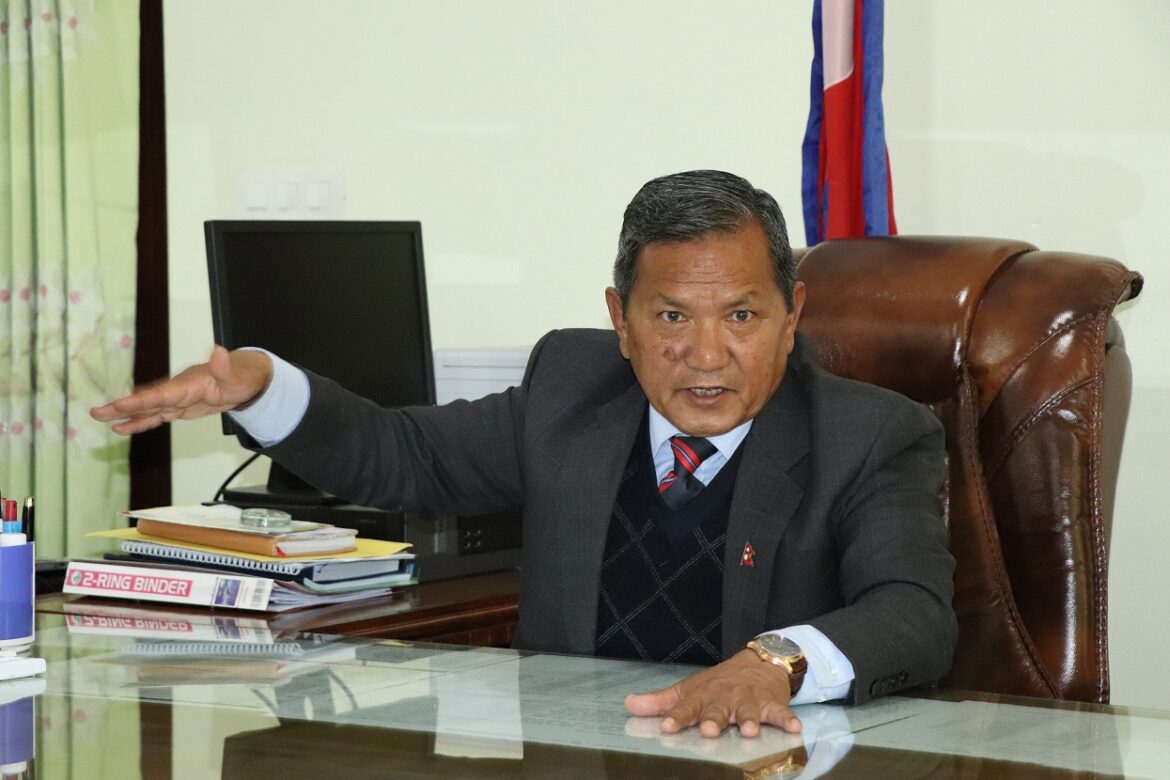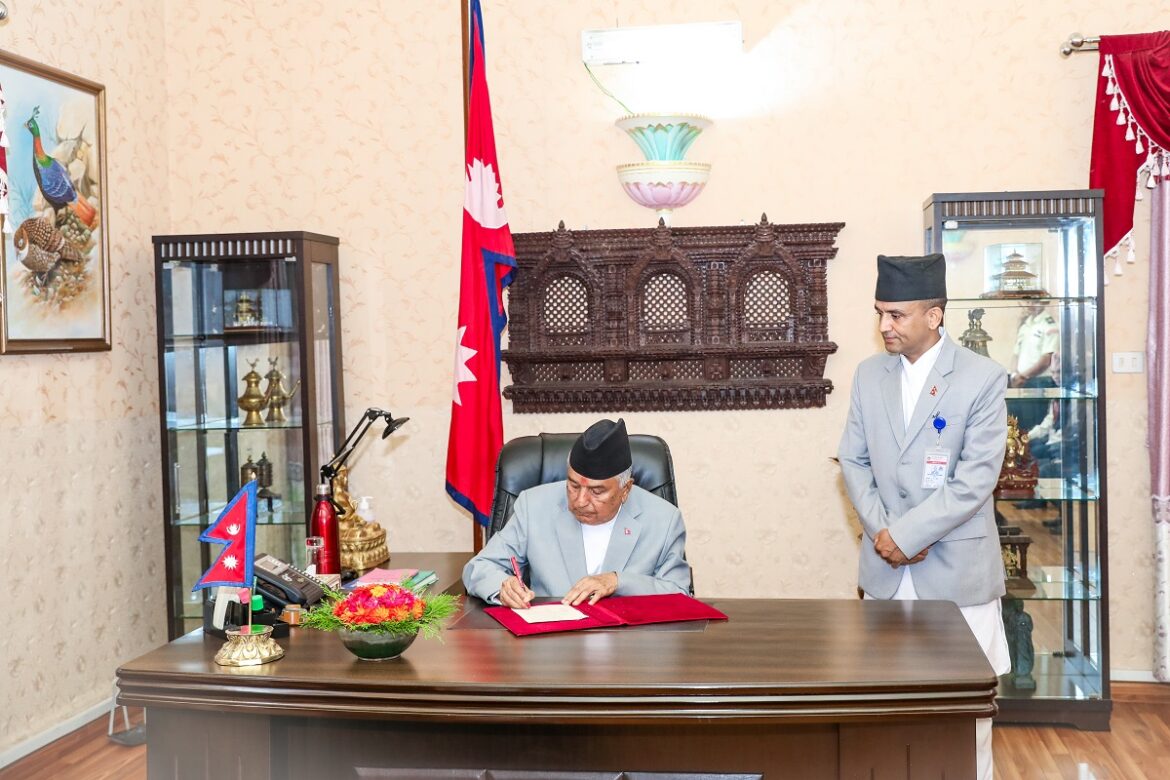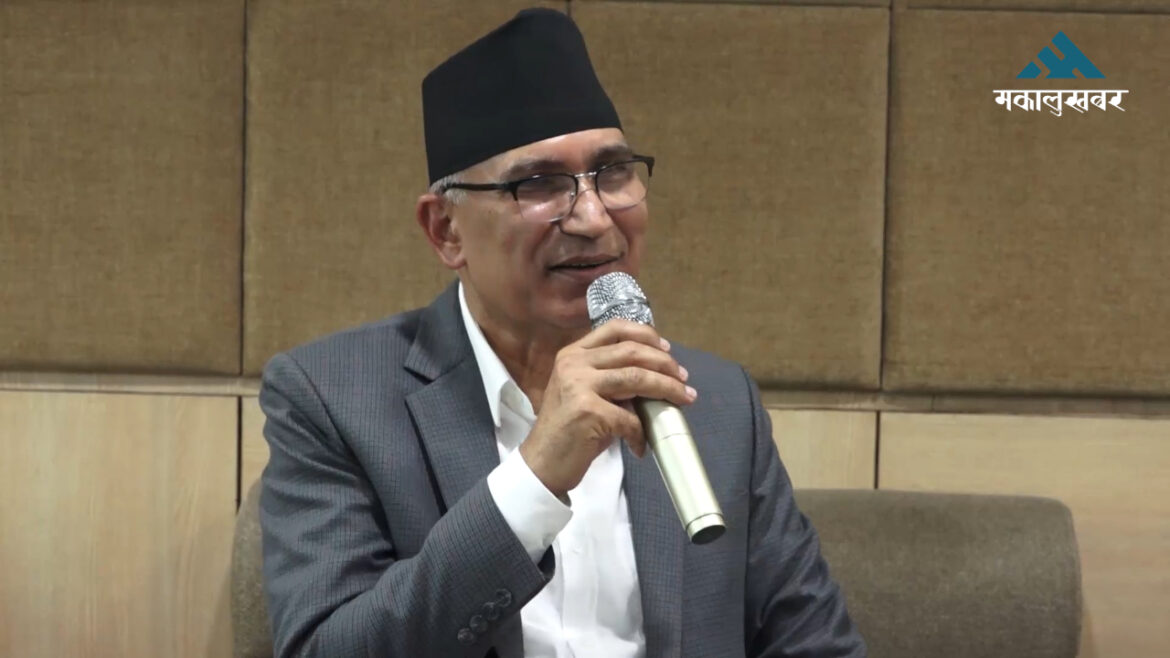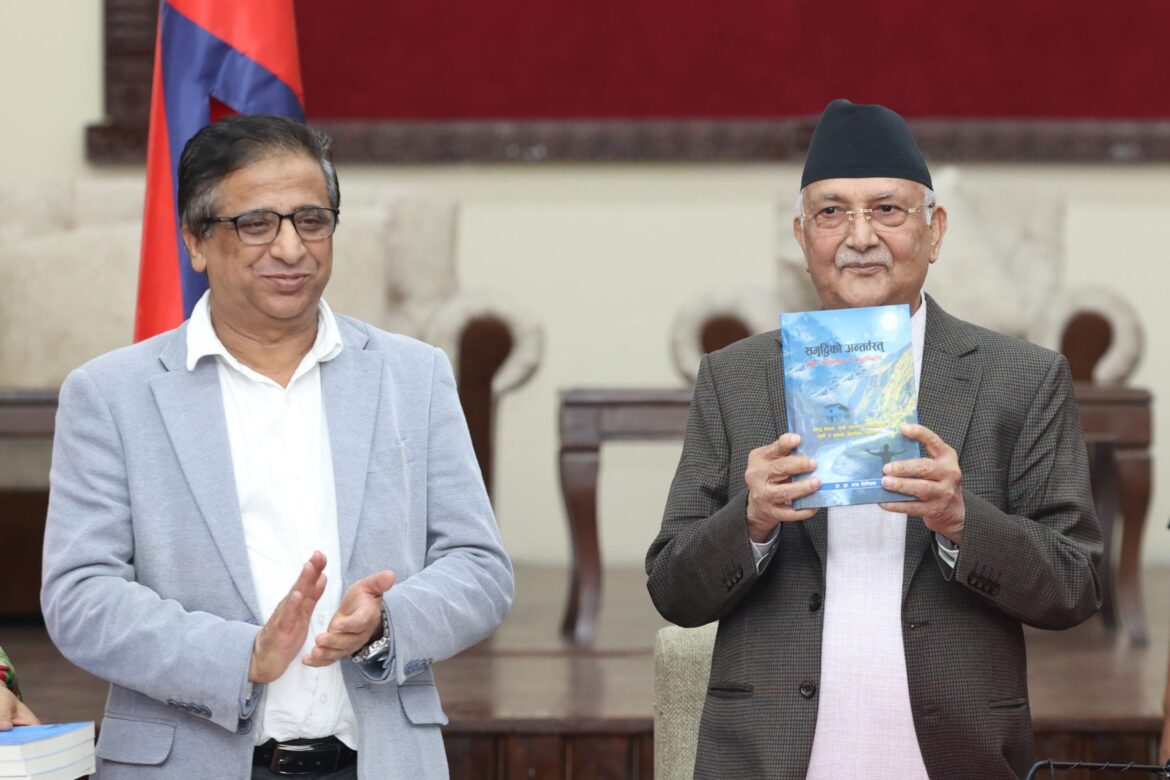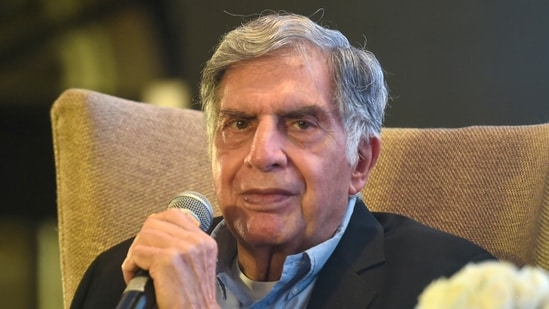KATHMANDU: The Kathmandu Metropolitan City has installed its own board at the Gaushala Dharmshala in the Pashupati area.
On Wednesday, the city police removed the board of the Marwadi Service Committee and replaced it with their own, despite protests from the committee.
The city’s team used force to put up the new board.
Outside the Dharmshala, members of the Marwadi community held protests against the city’s actions.
A team led by Ward Chairperson Ashman Sangat and the Chief of City Police Rajunath Pandey visited the Dharmshala to enforce the eviction.
The police attempted to vacate the premises by making announcements until 10 a.m., but when the committee did not comply, they forcibly removed them.
During a prior press conference, Ramesh Tadiya, the president of the Marwadi Service Committee Nepal, warned that the metropolitan authority should not engage in any activities at the Dharmshala.
He emphasized that the full text of the court ruling had not yet been received, and since the court is currently on vacation, the committee should be granted the right to present their case once the full ruling is available.
Following the police’s attempts to clear the Dharmshala, there was a brief confrontation with the Marwadi community.
South Asia
Govt is committed to making postal services as hub of e-commerce: Minister Gurung
KATHMANDU: Minister for Communications and Information Technology, Prithvi Subba Gurung, has reiterated the government’s commitment to strengthening the Nepal Postal Service so as to developing it into a centre of e-commerce at the national and international level.
In a message of best wishes given on the occasion of the World Post Day today, he said diversification and modernization of postal service is the need of the day rendering the global communication through postal services more effective and timely.
“The government is committed to promoting the Nepal Post Service to make it the centre of e-transactions at the national and international level with the use of information technology,” Minister Gurung stated in the message.
He has stressed on the need of diversifying the domestic postal services, suggesting the Nepal Postal Service to maintain its glory and credibility by providing prompt, timely and efficient services while competing with similar services like courier and parcel service and transport service operated by the private sector.
The Communications and Information Technology Minister said the restructuring of the Post Office has been carried out in line with the concept of ‘one local body – one post office’ for the structural transformation of Nepal Post from the current fiscal year.
“The Nepal Post is always committed for partnering with the Universal Postal Union on the topic of providing quality postal services to the postal service users throughout the world,” Minister Gurung said.
KATHMANDU: The Ministry of Energy, Water Resources, and Irrigation has asked for clarification from Kulman Ghising, the Executive Director of the Nepal Electricity Authority (NEA).
The ministry has requested Ghising to provide details on all the work, agreements, staffing, and financial records from the past four years under his leadership at the NEA.
Energy Minister Deepak Khadka issued the letter to Ghising, demanding the clarification within 15 days.
Recently, tensions have been rising between the government and the NEA, with rumors circulating that the government is seeking to remove Ghising from his position.
KATHMANDU: President Ram Chandra Paudel has certified the bill related to the regulation of Nepal University on Wednesday.
The Office of the President informed that the bill, which had been passed by both Houses of the Federal Parliament (House of Representatives and National Assembly), was certified in accordance with Article 113(2) of the Constitution.
KATHMANDU: Deputy Prime Minister and Finance Minister Bishnu Prasad Paudel has said the incumbent government is committed to strengthening the rights of workers and addressing the national resolution for prosperous Nepal, happy Nepali through a sound industrial labour relation.
Opening the 26th General Council of the International Trade Union Confederation (ITUC) – Asia Pacific here today, the Deputy Prime Minister said the implementation of a policy to adjust the minimum wages for workers as per the demand of time is in progress.
He said new forms of workplace issues and challenges are emerging and collective efforts are warranted to address them. Workers’ issues are more or less of the same nature across the globe, he added.
Reminding of the Constitutional rights to practice trade union movement and for collective bargaining, he said it has guaranteed the right to employment as the fundamental right of citizens.
The Finance Minister added the government is sensitive to ensuring rights to employment, social justice, and social security to workers.
He went on to say that the government is working to enhance the labor force, making it further skilled and professional. “The government is active to enable an industrial atmosphere by establishing decent labor relations,” he said, adding that the government will accept the labor force as a prime socio-economic force of the country.
As he said, the government has pursued a policy of creating ample jobs within the country.
Nepal Trade Union Congress general secretary Ajay Kumar Rai said the country continues to incur a huge loss due to the ‘impact’ of climate change, drawing the government’s attention to focus on addressing the needs and issues of daily-wage earners.
The two-day event has been attended by the All Nepal Trade Union Federation, Nepal Trade Union Federation, and trade union leaders and activists from the Asia-Pacific region.
KATHMANDU: Prime Minister KP Sharma Oli has launched a book titled “Samriddhiko Antarbastu”, written by Professor Tattwa Timilsina.
During the book launch at the Prime Minister’s residence today, he emphasized that while every living being desires happiness, humans need to eliminate poverty to lead a dignified and secure life. He stressed the importance of moving towards the journey of a “prosperous world, happy humanity.”
Highlighting the right of every individual to live a dignified life, Prime Minister Oli also stated that discussions on prosperity must not overlook environmental conservation.
Author Timilsina explained that the book provides a scientific analysis of happiness and well-being in light of Prime Minister Oli’s vision of “Prosperous Nepal, Happy Nepali,” which is a national aspiration.
Published by the Center for the Study and Research of Prosperity, the book evaluates prosperity from the perspectives of mind, intellect, and mental state, along with various social and economic aspects.
Ratan Tata death: How US media covered passing of ‘powerful and admired’ Indian business leader
Ratan Tata death: How US media covered passing of ‘powerful and admired’ Indian business leader BySumanti Sen Oct 10, 2024 11:05 AM IST Share Via Copy Link Ratan Tata, the Chairman Emeritus of Tata Sons, died aged 86 on Wednesday, October 9, at Mumbai’s Breach Candy Hospital. Ratan Tata, the Chairman Emeritus of Tata Sons, died aged 86 on Wednesday, October 9, at Mumbai’s Breach Candy Hospital. Tata was in critical condition and in the ICU at the hospital, shortly after announcing that he was undergoing routine medical investigations due to his age, and medical conditions related to age. Ratan Tata death: How US media covered passing of Indian business leader Known as someone who drove India to greater development and prosperity, and hailed for his humanity and compassion, Tata is being mourned not just in India, but across the globe, including in the United States by Indian Americans.
Tata’s quiet demeanour, love for animals, humility and kindness enhanced his international profile. His concern for other humans and immense generosity paved the way for scholarship and research that in turn led to the betterment of health and education of millions of people not just in India, but also beyond. Tata graduated from Cornell with a degree in architecture. In the years that followed, his visionary leadership and philanthropy, coupled with his commitment to humanity, had a huge global impact in advancing education and research across various sectors, as J. Meejin Yoon, the Dean of Cornell University College of Architecture, Art, and Planning pointed out. Tata, who served three terms as a Cornell trustee from 2006 to 2022, was named Cornell’s Entrepreneur of the Year in 2013. It is thus natural that the US media would widely cover his life and death. Here’s how the US media covered Tata’s death:The New York Times’ headline reads “Ratan Tata, Whose Indian Business Empire Went Global, Dies at 86”. The article described Tata as “one of India’s most powerful and admired magnates, who transformed his family’s business conglomerate, the Tata Group, into a multinational corporation with globally recognizable brands”.
CNN’s headline reads, “Ratan Tata, Indian tycoon who took his empire global, dead at 86”. CNN mentioned how Tata rose to global prominence with various “high-profile international deals,” and mentioned how he “oversaw Tata Motors’ purchase of British car brands Jaguar and Land Rover from Ford (F).” The outlet also touched on Tata’s effort to improve “the lot of India’s many stray animals.” CNBC’s headline reads, “Ratan Tata, the former chairman of Indian conglomerate Tata Sons, dies at age 86”. The outlet detailed Tata’s achievements, including the fact that he “pioneered commercial aviation in India when it launched an airline in 1932 that later became Air India” and that he “ received the Padma Bhushan, one of India’s most distinguished civilian awards, in 2000 and “Padma Vibhushan” in 2008.” CBS News headlined its story, “Ratan Tata, Indian magnate who built global conglomerate Tata Group, is dead at 86’. LIke the other outlets, CBS News also wrote about Tata’s achievements. Fox 2’s article is headlined, “Ratan Tata, the former chairman of Indian conglomerate Tata Sons, dies at 86”. Its article also focuses on Tata’s achievements and tributes that are pouring in for him.

